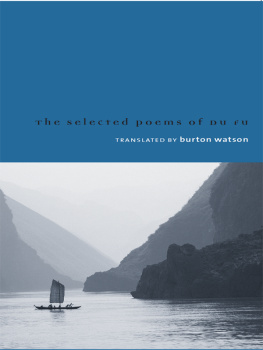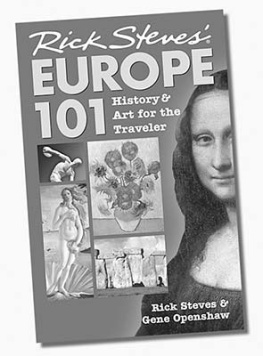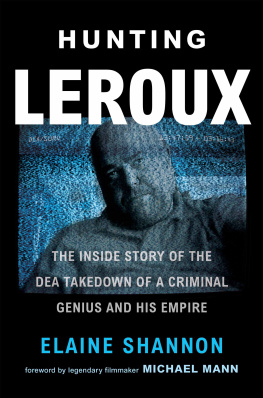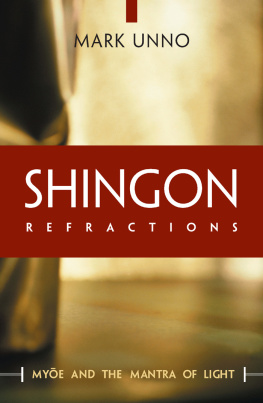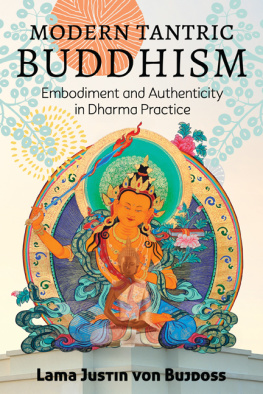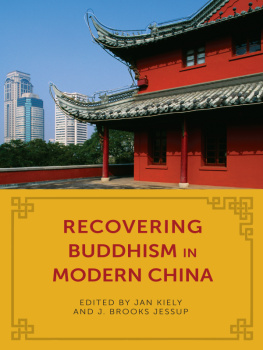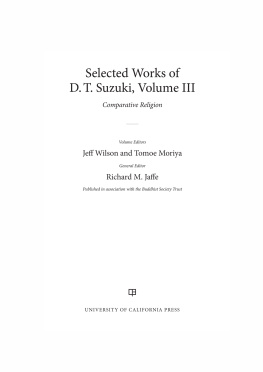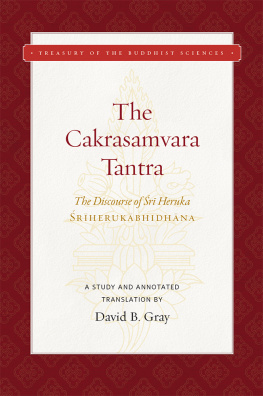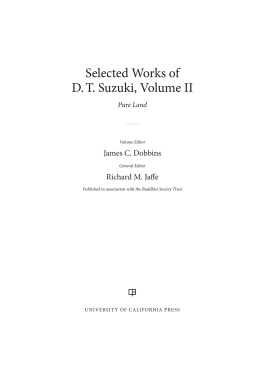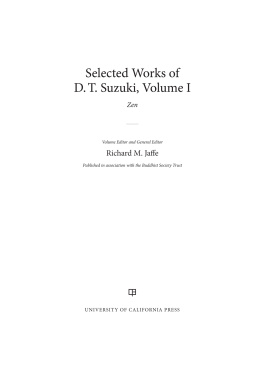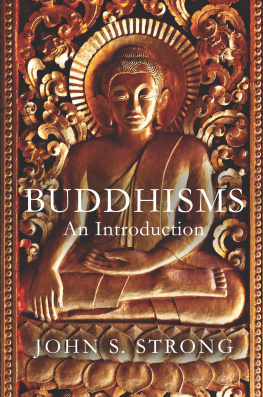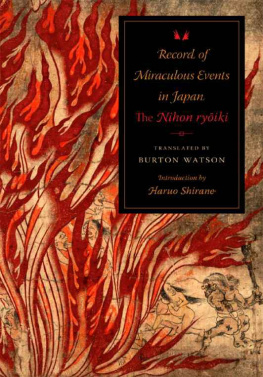The selected poems of Du fu
TRANSLATIONS FROM THE ASIAN CLASSICS
TRANSLATIONS FROM
THE ASIAN CLASSICS
Editorial Board
Wm. Theodore de Bary, Chair
Paul Anderer
Irene Bloom
Donald Keene
George A. Saliba
Haruo Shirane
David D. W. Wang
Burton Watson
The selected
poems of
Du fu
burton watson
COLUMBIA UNIVERSITY PRESS NEW YORK
COLUMBIA UNIVERSITY PRESS
Publishers Since 1893
New York Chichester, West Sussex
cup.columbia.edu
Copyright 2002 Columbia University Press
All rights reserved
E-ISBN 978-0-231-50229-0
Library of Congress Cataloging-in-Publication Data
Du, Fu, 712770.
The selected poems of Du Fu / Burton Watson.
p. cm.(Translations from the Asian classics)
Includes bibliographical references.
ISBN 0231128282 (alk. paper)
ISBN 0231128290 (pbk. : alk. paper)
1. Du, Fu, 712770Translations into English.
I. Watson, Burton, 1925 II. Title. III. Series.
PL2675.A276 2002
895.113dc21
2002073778
A Columbia University Press E-book.
CUP would be pleased to hear about your reading experience with this e-book at .
contents
| 712 | Born in Gong District, Henan. Father, Du Xian, a minor official. |
| 731735 | Period of youthful wandering in area of Jiangsu and Zhejiang (Wu and Yue). |
| 735 | Goes to Changan to take jinshi examination; fails exam. |
| 736740 | Period of wandering in Shandong and Hebei (Qi and Zhao). |
| 741 | Returns to Luoyang area. |
| 744745 | Friendship with Li Bai in Luoyang area. |
| 746 | Goes to Changan. |
| 747 | Takes special exam given by Emperor Xuanzong. Due to machinations of chief minister Li Linfu, all candidates fail. |
| 750 | In Changan. Eldest son Zongwen born. |
| 753 | Second son Zongwu (Pony Boy) born. |
| 755 | Outbreak of An Lushan Rebellion. Luoyang falls to rebels. |
| 756 | Flees the rebels with his family; settles wife and family at Qiang Village in Fuzhou, north of capital. Emperor Xuanzong flees Changan, relinquishes throne to son, Emperor Suzong. Du Fu attempts to reach court of Suzong but is captured by rebels, detained in Changan. |
| 757 | In fourth month, escapes Changan, reaches court of Suzong at Fengxiang, is appointed Reminder. Incurs imperial displeasure for defending Fang Guan. Ordered to join family in Fuzhou. In eleventh month returns to Changan, now in government control. |
| 758 | In Changan in post of Reminder. In sixth month banished to minor post in Huazhou east of capital. |
| 759 | Leaves Huazhou in seventh month because of famine, travels west to Qinzhou. In tenth month goes to Tonggu. At end of year travels west to Chengdu in Sichuan. |
| 760 | Moves into thatched hall at Wash-Flower Stream in Chengdu. |
| 762 | To escape rebellion in Chengdu, moves to Zizhou. |
| 764 | Returns to Chengdu, takes post in local government. |
| 765 | Resigns post, returns to thatched hall. In fifth month leaves Chengdu with family, journeys down Yangzi River to Yunan. |
| 766 | Travels down Yangzi to Kuizhou, moves into western lodge. |
| 767 | Moves to Rangxi, later to East Camp in Kuizhou. |
| 768 | Leaves Kuizhou, goes down Yangzi to Yueyang in Hunan. |
| 769 | Travels in Lake Dongting area. |
| 770 | In Tanzhou in Hunan. Hopes to travel on to Changan but dies in Tanzhou region near end of year. |
Du Fu, the eliciter of superlatives! The Chinese scholar William Hung, who wrote the definitive book in English on Du Fus life and poetry, gave it the unequivocal title Tu Fu: Chinas Greatest Poet. Professor Stephen Owen of Harvard, the leading American authority on Chinese poetry of the Tang period, enthusiastically seconds Hungs estimation of Du Fu. And the American poet and translator Kenneth Rexroth, who rendered some of Du Fus poems in English, goes a step further to declare him the greatest non-epic, non-dramatic poet who has survived in any language.
My aim in the present volume is neither to question nor to confirm these judgments, but simply to present a selection of Du Fus works in translation, though later in this introduction I would like to examine some of the reasons that could be cited to support these claims to greatness. Some fourteen hundred poems attributed to Du Fu have come down to us, but his fame rests mainly on one hundred or so poems that have been widely admired, commented on, and anthologized over the centuries by the Chinese and other peoples within the Chinese cultural sphere. My own selection of 135 poems includes translations of most of the poems for which he is best remembered along with a few less famous works that I believe deserve notice.
Du Fus poetry was profoundly influenced by the troubled times in which he lived; before considering the poems themselves, it may therefore be helpful to give a brief summary of his life. Little biographical information regarding him has survived, and almost all of what we know of him comes from his own poems and other writings. A chronological outline of his life will be found on pp. viiviii, but even some of the data listed there is conjectural in nature, as is much of the dating of the poems in my selection.
Du Fu came from a distinguished family of literati. His most illustrious ancestor was Du Yu (222284), a literary leader and Confucian scholar who compiled an authoritative commentary on the Zuozhuan, one of the most important historical texts of the Confucian canon. Also of prominence was his paternal grandfather, Du Shenyan (d. 708), an official in the Tang bureaucracy and one of the outstanding poets of his time. Du Fus father, Du Xian, also held an official post, though a minor one, and little is known of him. Du Fus mother, whose surname was Cui, apparently died shortly after he was born; the younger brothers and sister he mentions in his poetry are almost certainly children by a second wife.
Du Fu, whose courtesy name was Zimei, was born in 712, one year before Emperor Xuanzong came to the throne. His place of birth is uncertain, but it is usually listed as Gong District in the Luoyang area of Henan. Almost nothing is known of his early years, though being the son of a family that for successive generations had held official posts, he no doubt worked diligently to prepare for the civil service examinations that opened the way to such offices. This involved intensive study and memorization of the classics of Confucianism, the standard histories, and literary works such as the voluminous Wenxuan, or Literary Anthology. He was well versed in Daoist literature as well and, as he himself mentions, at some point studied the doctrines of the Chan, or Zen, school of Buddhism and acquired a considerable knowledge of Buddhist writings.
In his poems he refers to two periods of youthful wandering, the first, probably in the years around 731735, to Jiangsu and the seacoast area of Zhejiang, and the second some years later to the northeast region of Shandong and Hebei. At some point, probably in 735, he went to the capital, Changan, to take the examination for jinshi, or Presented Scholar. Much to the bafflement of scholars and admirers of later generations, he failed to make a passing grade.

